
Stephanus van Cortlandt was the first native-born mayor of New York City, a position which he held from 1677 to 1678 and from 1686 to 1688. He was the patroon of Van Cortlandt Manor and was on the governor's executive council from 1691 to 1700. He was the first resident of Sagtikos Manor in West Bay Shore on Long Island, which was built around 1697. A number of his descendants married English military leaders and Loyalists active in the American Revolution, and their descendants became prominent members of English society.
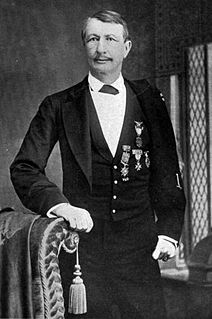
John Watts de Peyster, Sr. was an American author on the art of war, philanthropist, and the Adjutant General of New York. He served in the New York State Militia during the Mexican–American War and American Civil War. He was one of the first military critics and noted for his histories of the Revolutionary and Civil Wars, and also published works of drama, poetry, military history, military biography and military criticism.
Jacobus van Cortlandt (1658–1739) was a wealthy Dutch-born American merchant, slave owner, and politician who served as the 30th and 33rd Mayor of New York City from 1710 to 1711 and again from 1719 to 1720.
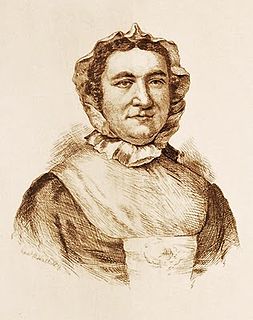
Mary Spratt Provoost Alexander was an influential colonial era merchant in New York City.
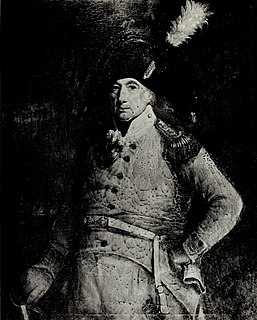
Arent Schuyler DePeyster was an American born British colonial military officer best known for his term as commandant of the British controlled Fort Michilimackinac and Fort Detroit during the American Revolution. Following the capture of Lieutenant-Governor General Henry Hamilton, DePeyster is often credited as being the military leader of British and Indian forces in the Western American and Canadian frontiers.
The Schuyler family was a prominent Dutch family in New York and New Jersey in the 18th and 19th centuries, whose descendants played a critical role in the formation of the United States, in leading government and business in North America and served as leaders in business, military, politics, and society. The other two most influential New York dynasties of the 18th and 19th centuries were the Livingston family and the Clinton family.

Johnston Livingston de Peyster was a soldier in the Union Army during the American Civil War and later a member of the New York State Assembly from Dutchess County, New York. The son of a wealthy old Dutchess County family, de Peyster joined the Union Army at the age of eighteen. He saw service in the eastern theater, and is best remembered for raising the first Union flag over the Confederate capitol of Richmond, Virginia, after its fall in 1865.
Gerard Bancker was an American surveyor and politician.
The history of Albany, New York from 1664 to 1784 begins with the English takeover of New Netherland and ends with the ratification of the Treaty of Paris by the Congress of the Confederation in 1784, ending the Revolutionary War.

Abraham de Peyster was the 20th mayor of New York City from 1691 to 1694, and served as Governor of New York, 1700–1701.
Johannes de Peyster or Johannes de Peyster II was the 23rd Mayor of New York City between 1698 and 1699.
Johannes de Peyster Sr. was a Dutch merchant who immigrated to New Netherland some time before 1651. He was the patriarch of a long line of influential and wealthy family members, who, along with the Van Cortlands, Schuylers, Livingstons, and others, formed New York City’s social and political elite.
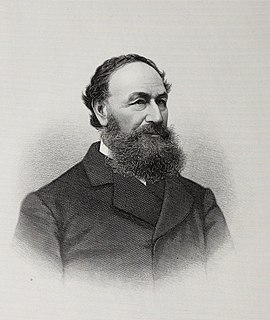
Frederic de Peyster II was a New York City lawyer and prominent member of the De Peyster family.
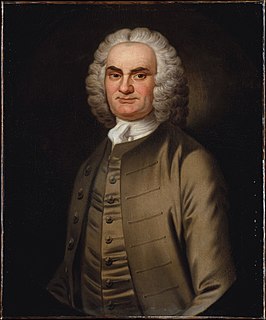
Joseph Reade was a merchant, vestryman, and politician from New York.

Johannes de Peyster or Johannes de Peyster III was the Mayor of Albany, New York three times between 1729 and 1742.
Volkert Petrus Douw was a merchant and politician from Albany, New York who was prominent both during colonial times and after the United States was established.
Myndert Schuyler was a colonial trader and merchant with extensive real estate holdings who served as Mayor of Albany, New York twice between 1719 and 1725.

Frederic James de Peyster was a prominent American soldier, lawyer, and member of New York Society during the Gilded Age.

Abraham de Peyster was a Loyalist and royal officer in the American Revolutionary War. He is best known for leading the Loyalists in the Battle of Kings Mountain and for helping, after the war, to settle the new royal colony of New Brunswick.
Abraham de Peyster, was a Dutch-American who served as the treasurer of the Province of New York.
This page is based on this
Wikipedia article Text is available under the
CC BY-SA 4.0 license; additional terms may apply.
Images, videos and audio are available under their respective licenses.
![]() Media related to De Peyster (surname) at Wikimedia Commons
Media related to De Peyster (surname) at Wikimedia Commons









